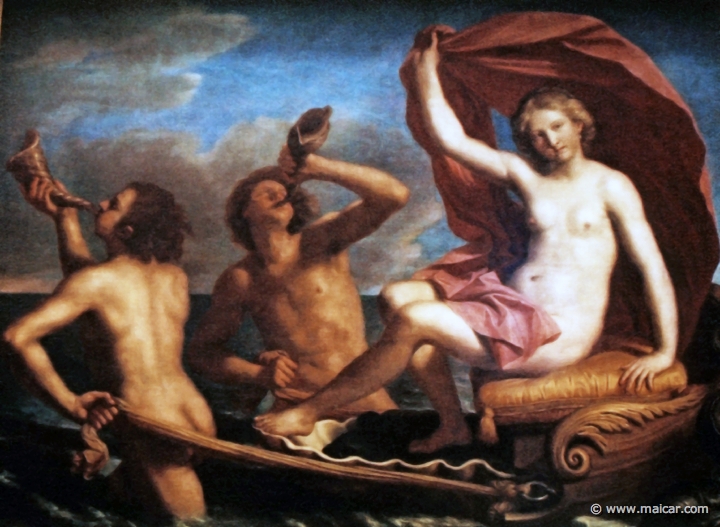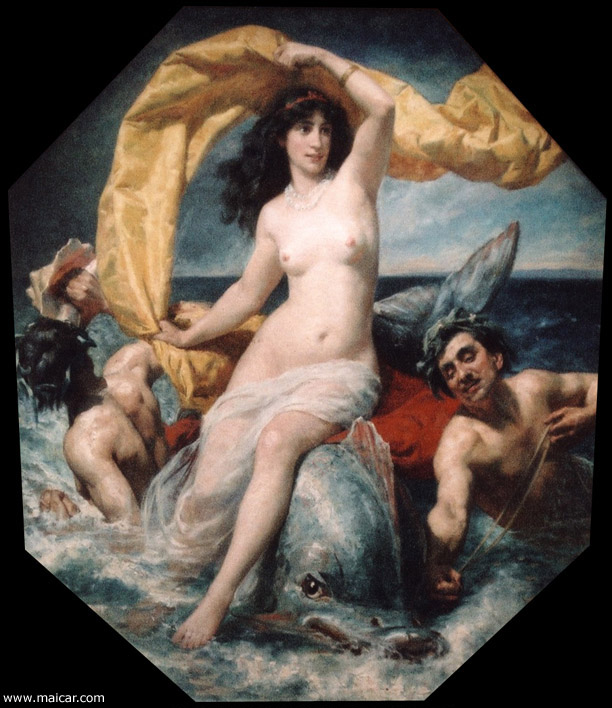|
The NEREIDS are Sea-NYMPHS,
assumed to be fifty in number. Few among them have myths of
their own.
It is told that Queen Cassiopea 2 boasted of being better than them all, and the NEREIDS were angered. So Poseidon, sharing their wrath, sent a flood and a monster against Ethiopia. As a result of the calamity that followed, Andromeda was exposed as a prey to calm the monster, being later delivered by Perseus 1.
The NEREIDS are also remembered for having helped the ARGONAUTS to steer their ship when they encountered Charybdis and Scylla 1, and the Wandering Rocks.
| Family |
|
|
Nereus, who dwells in the Aegean Sea, was a god who could turn himself into all kinds of shapes. Nereus is son of Pontus (Sea) and Gaia (Earth).
Doris 1 is one of the OCEANIDS.
(See also Table Theogony.)
|
|
|
|
|
|

|
The nereid Galatea 1. 0614: Galatea. Painting by Giovanni Francesco Barbieri, called Guercino, 1591-1666. Künsthistorische Museum, Wien.
|
|
|

|
Amphitrite, who sometimes is counted
among the OCEANIDS,
became, through her marriage with Poseidon, the Queen of the Sea. Their children are Triton, Rhode 2, and Benthesicyme. |
| |
Arethusa 1 was mother of Abas 1, the king of Euboea, by Poseidon. |
Cydippe 1 was in the company of Cyrene. |

|
Galatea 1 was loved by the Cyclops Polyphemus 2, but
she, loving Acis, refused him. For this reason Acis
was buried by a rock hurled at him by the jealous Polyphemus 2, and
was turned into a river. |
| |
Psamathe 1 turned herself into a seal to
avoid Aeacus, but nevertheless she had a son Phocus 3 by him. Phocus 3 was a great athlete and because of this his half-brothers Peleus and
Telamon plotted against him, and Telamon killed him
in a match by throwing a quoit at his head. Some
affirm Peleus and not Telamon who killed Phocus 3. But because of this murder, which some think was committed to please their mother Endeis (whereas others think it was an accident and not a murder), both Peleus and Telamon were
banished from Aegina by Aeacus. Some generations later, Pylades plotted together
with Orestes 2 against Neoptolemus, son of Achilles, son of Peleus and Thetis. Pylades himself was son of Strophius 1, son of Crisus, son of Phocus 3. It is said that because of the crime committed against her son Phocus 3, Psamathe 1 sent a terrible wolf to destroy the cattle of Peleus, who could not do anything except pray to the Nereid that she put away her wrath. At first she remained unmoved by these prayers, but Thetis obtained, for her husband's sake, the forgiveness of Psamathe 1. After Aeacus, Psamathe 1 married King Proteus 3 of Egypt and had by him a daughter Eido (Theonoe 2), who was a priestess in Egypt, and a son Theoclymenus 2, who succeeded his father as king of Egypt and wished to marry Helen. |

|
Thetis. Some interventions of the
enchanting silver-footed Thetis may be read at: Achilles, Aphrodite, Charybdis, Dionysus 2, Poseidon, Priam 1, Prometheus 1, Themis, Trojan War, and Zeus. Zeus and Poseidon were once
rivals for the hand of Thetis, but when Themis or the MOERAE or Proteus 2 prophesied
that the son born of Thetis would be mightier than
his father, they withdrew. Zeus then, bade his
grandson, mortal Peleus,
to marry her. But because Thetis could easily evade
anyone using her power to change into different
forms, Proteus 2 (who
also knew that art) gave Peleus the necessary
instructions in order to conquer her. It was at the
wedding of Peleus and
Thetis that Eris (Discord)
threw the fatal Apple, which led to the Judgement
of Paris, which led to the
abduction of Helen, which
led to the Trojan War,
in which her beloved son Achilles should perish.
A protective mother, Thetis tried to make her child Achilles immortal but,
as some say, she was prevented by Peleus. She then left her
husband's home for ever, returning to the sea.
Later, foreseeing that it was fated Achilles should perish in the war, she disguised him as a girl and entrusted him to King Lycomedes 1 of Scyros. In the last year of the Trojan War, Agamemnon outraged Achilles by taking away
his prize (fair-cheeked Briseis), thus causing Achilles' remembered
wrath, which brought countless woes upon the
Achaeans, as the goddess sings. Then Thetis visited Zeus, and, putting her left
arm round his knees while her right hand touched
his chin, prayed to him:
"Father Zeus, if ever amid the immortals I gave
you aid by word or deed, grant me this prayer: do
honour to my son, who is already singled out for
early death; yet now Agamemnon has dishonoured him, for he has
taken and keeps his prize by his own arrogant act.
Avenge my son, Olympian Zeus, lord of counsel; and give might
to the Trojans, until the Achaeans pay him due
respect, and magnify him with recompense." (Thetis to Zeus.
Homer, Iliad 1.500).
And Zeus, listening to
her prayer, allowed the Achaeans to suffer
countless losses. |
|

|
8513: Nereid. Painting at Frederiksborg, Denmark. (Artist n/a.)
|
|
|
|
Apollodorus, Library 1.2.7ff.
|
Hesiod, Theogony 240ff.
|
Homer, Iliad 18.38ff.
|
Hyginus, Fabulae, Preface
|
|
Actaea 2.
|
Actaea 2.
|
Actaea 2.
|
Actaea 2.
|
|
Agave 1.
|
Agave 1.
|
Agave 1.
|
Agave 1.
|
| |
|
Amathia.
|
Amathia.
|
| |
|
Amphinome 1.
|
Amphinome 1.
|
| |
|
Amphithoe.
|
Amphithoe.
|
|
Amphitrite.
|
Amphitrite.
|
|
|
| |
|
Apseudes.
|
Apseudes.
|
| |
|
|
Arethusa 1.
|
| |
|
|
Asia 1.
|
|
Autonoe 3.
|
Autonoe 3.
|
|
|
| |
|
|
Beroe 1.
|
| |
|
Callianassa.
|
Callianassa.
|
| |
|
Callianira.
|
|
|
Calypso 1.
|
|
|
|
|
Ceto 2.
|
|
|
|
| |
|
|
Clio 2.
|
| |
|
Clymene 4.
|
Clymene 4.
|
|
Cranto.
|
|
|
|
| |
|
|
Creneis.
|
| |
|
|
Cydippe 1.
|
| |
Cymatolege.
|
|
|
|
Cymo.
|
Cymo.
|
|
|
| |
Cymodoce 1.
|
Cymodoce 1.
|
Cymodoce 1.
|
|
Cymothoe.
|
Cymothoe.
|
Cymothoe.
|
Cymothoe.
|
| |
|
|
Deiopea 1.
|
|
Dero.
|
|
|
|
| |
|
Dexamene.
|
Dexamene.
|
|
Dione 2.
|
|
|
|
| |
Doris 2.
|
Doris 2.
|
Doris 2.
|
|
Doto.
|
Doto.
|
Doto.
|
Doto.
|
| |
|
|
Drymo.
|
|
Dynamene.
|
Dynamene.
|
Dynamene.
|
Dynamene.
|
|
Eione.
|
Eione.
|
|
|
| |
|
|
Ephyra 2.
|
|
Erato 4.
|
Erato 4.
|
|
|
|
Eucrante.
|
Eucrante.
|
|
|
|
Eudore 2.
|
Eudore 2.
|
|
|
|
Eulimene 1.
|
Eulimene 1.
|
|
|
|
Eumolpe.
|
|
|
|
|
Eunice.
|
Eunice.
|
|
|
| |
|
|
Eurydice 4.
|
| |
Eupompe.
|
|
|
|
Evagore.
|
Evagore.
|
|
|
| |
Evarne.
|
|
|
|
Galatea 1.
|
Galatea 1.
|
Galatea 1.
|
Galatea 1.
|
| |
Galene.
|
|
|
| |
Glauce 3.
|
Glauce 3.
|
Glauce 3.
|
|
Glauconome.
|
Glauconome.
|
|
|
|
Halie 1.
|
|
Halie 1.
|
|
|
Halimede.
|
Halimede.
|
|
|
|
Hipponoe.
|
Hipponoe.
|
|
|
|
Hippothoe 1.
|
Hippothoe 1.
|
|
|
| |
|
Iaera 1.
|
Iaera 1.
|
| |
|
Ianassa.
|
Ianassa.
|
|
Ianira 2.
|
|
Ianira 2.
|
Ianira 2.
|
|
Ione 1.
|
|
|
|
| |
Laomedia.
|
|
|
| |
Leiagore.
|
|
|
| |
|
|
Leucothoe 1.
|
| |
|
|
Ligea.
|
|
Limnoria.
|
Limnoria.
|
|
Limnoria.
|
| |
|
|
Lycorias.
|
|
Lysianassa 1.
|
Lysianassa 1.
|
|
|
| |
|
Maera 1.
|
Maera 1.
|
|
Melite 1.
|
Melite 1.
|
Melite 1.
|
Melite 1.
|
| |
Menippe 1.
|
|
|
|
Nausithoe.
|
|
|
|
| |
Nemertes.
|
Nemertes.
|
Nemertes.
|
|
Neomeris.
|
|
|
|
|
Nesaea.
|
Nesaea.
|
Nesaea.
|
Nesaea.
|
| |
Neso.
|
|
|
| |
|
|
Opis 1.
|
| |
|
Orithyia 1.
|
Orithyia 1.
|
| |
|
|
Panopaea.
|
|
Panope 1.
|
Panope 1.
|
Panope 1.
|
Panope 1.
|
| |
Pasithea 1.
|
|
|
|
Pherusa 1.
|
Pherusa 1.
|
Pherusa 1.
|
Pherusa 1.
|
| |
|
|
Phyllodoce.
|
|
Plexaure 2.
|
|
|
|
|
Polynome.
|
|
|
|
| |
Ploto.
|
|
|
|
Pontomedusa.
|
|
|
|
| |
Pontoporia.
|
|
|
| |
Poulunoe.
|
|
|
| |
Pronoe 1
|
|
|
|
Proto.
|
Proto.
|
Proto.
|
Proto.
|
| |
Protomedia.
|
|
|
|
Psamathe 1.
|
Psamathe 1.
|
|
|
|
Sao.
|
Sao.
|
|
|
|
Spio.
|
Spio.
|
Spio.
|
Spio.
|
| |
|
Thalia 3.
|
Thalia 3.
|
| |
Themisto 1.
|
|
|
|
Thetis.
|
Thetis.
|
Thetis.
|
|
| |
Thoe 2.
|
Thoe 2.
|
Thoe 2.
|
| |
|
|
Xantho.
|
|
|
|
|